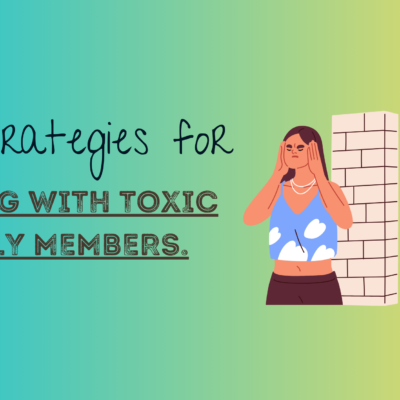Top Strategies for Dealing with Toxic Family Members: Family is usually deemed the basis of our support system, giving us love, guidance, and encouragement. However, not all family situations are positive. For some, handling relationships with toxic family members can be challenging which causes stress, anxiety, and emotional disruption. In this article, we will talk about the strategies for dealing with toxic family members while staying positive and keeping your mental health.
Also Read:
- How to Improve Myself in a Relationship?
- Why Is It so Hard to Get over My Ex?
- What Are The Signs of Spiritual Twin Flame?
- Secret to Communicating With Difficult People.
- How to Make a Long Term Relationship Work?
What is Toxicity in Family Relationships?
Toxicity within family relationships can arise in different ways, including manipulation, criticism, control, verbal or physical abuse, neglect, and boundary violations. These behaviors can arise from unresolved conflicts, deep-seated insecurities, personality disorders, or generational patterns. Irrespective of the root cause, dealing with toxic family members needs careful thinking and self-awareness.
Top Strategies for Dealing with Toxic Family Members:
Identifying Toxic Patterns
The first step in dealing with toxic family members is identifying the patterns of toxicity within the relationship. This may include acknowledging how particular behaviors make you feel, such as anxiety, frustration, guilt, or inadequacy. Pay attention to routines, such as constant criticism, emotional manipulation, or a lack of respect for boundaries. Identifying these patterns can help you set healthier boundaries and protect your well-being.
Setting Boundaries
Setting clear boundaries is important when dealing with toxic family members. Boundaries specify what behavior is acceptable and what is not, helping to protect your emotional and mental health. Communicate your boundaries assertively but respectfully, and be prepared to implement them if they are broken. Remember that setting boundaries is not about manipulating others but rather about taking care of yourself.
Practicing Self-Care
Dealing with toxic family members can be emotionally exhausting, so it’s important to prioritize self-care. Take time for activities that bring you joy and relaxation, whether it’s exercise, meditation, spending time with supportive friends, or pursuing hobbies. Nurture yourself emotionally by taking therapy or counseling if needed. Remember that you deserve to prioritize your well-being, even if you have family pressure or expectations.
Be Empathetic
While it may be difficult, developing empathy towards toxic family members can help you handle difficult interactions more effectively. Try to understand the underlying reasons for their behavior, such as past trauma or unmet emotional requirements. This doesn’t excuse their toxic actions, but it can provide an understanding of their viewpoint. Empathy can also help you react with compassion instead of react with anger.
Seeking Support
Dealing with toxic family members can feel isolating, but you don’t have to face it alone. Reach out to supportive friends, mentors, or other family members who understand your situation. Online support groups or therapy can also provide useful guidance and validation. Surrounding yourself with a support network can support your strength and provide an outlook during difficult times.
Setting Realistic Expectations
When dealing with toxic family members, it’s important to set realistic expectations for the relationship. Accept that you may not be able to modify their behavior or repair the relationship overnight. Instead, concentrate on what you can control, such as how you respond to their toxicity and the limitations you set. Modify your expectations accordingly, prioritizing your well-being above trying to satisfy or change others.
Limiting Contact
In some cases, limiting or cutting off contact with toxic family members is essential for your mental and emotional health. This can be a difficult decision fraught with guilt and uncertainty, but eventually, your well-being should be your priority. Take temporary breaks from communication or reduce the frequency of interactions. If the toxicity is unbearable or ongoing, you may need to consider more permanent measures to protect yourself.
Seeking Professional Help
If dealing with toxic family members becomes overwhelming or affects your mental health, don’t hesitate to seek professional help. A therapist or counselor can give objective guidance, coping strategies, and emotional support that suits the situation. Therapy can also help you handle complicated emotions, heal from past trauma, and grow healthier ways of relating to others.
At The End
Dealing with toxic family members is a difficult and usually painful experience, but it is important to prioritize your own well-being and mental health. By identifying toxic patterns, setting boundaries, practicing self-care, and seeking support, you can navigate these relationships more effectively.
Remember that you are not alone, and it is okay to prioritize your well-being, even if it means setting limits or stepping away from toxic dynamics. With time, patience, and self-compassion, you can reclaim your power and create healthier relationships created on respect, empathy, and mutual support.








